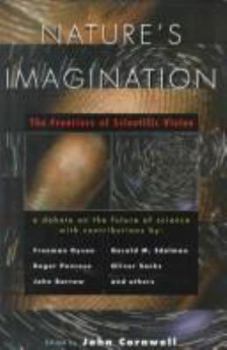Nature's Imagination: The Frontiers of Scientific Vision
"A person is not explainable in molecular, field-theoretical, or physiological terms alone." With that declaration, Nobel laureate Gerald M. Edelman goes straight to the heart of Nature's Imagination, a vibrant and important collection of essays by some of the world's foremost scientists. Ever since the Enlightenment, the authors write, science has pursued reductionism: the idea that the whole can be understood by examining and explaining each of its parts. But as this book shows, scientists in every discipline are reaching for a new paradigm that accounts for the whole--from the individual person to the universe itself. Nature's Imagination gathers together the work of thirteen leading mathematicians, astronomers, neuroscientists, and philosophers, as they discuss the revolution sweeping the sciences. Here Roger Penrose, Oliver Sacks, John Barrow, Gregory Chaitin, Maragret Boden, and others explore how and why classic reductionism is falling by the wayside in their own fields. As Freeman Dyson writes in the introduction, science is an art form, not a philosophical method, and it is always in search of new tools. Reductionism has done its work, and scientists are in search of another. Roger Penrose offers a fascinating account of irreducibility in mathematics, starting with the example of an impossible triangle--a drawing of a triangular object twisted so that could not exist in three dimensions. He breaks the triangle into three parts, showing that each corner is physically possible; only in combination is the triangle impossible. Both Penrose and mathematician Gregory Chaitin explore Godel's incompleteness theorem--as does John Barrow, who explains that Chaitin's proof of the theorem shows that, if we ever arrive at a Theory of Everything, there may be a still deeper and simpler unifying theory beyond that. Other contributors discuss the changing thinking in neuroscience, and the limitations of a mechanical view of the mind: as Oliver Sacks writes, "if we are to have a model or theory of mind as this actually occurs in living creatures in the world, it may have to be radically different from anything like a computational one." In addition, this volume includes staunch defenders of the classic scientific approach, such as Peter Atkins ("The omnicompetence of science, and in particular the simplicity its reductionist insight reveals, should be accepted as a working hypothesis until, if ever, it is proved inadequate"). The advance of science has been so startlingly swift in the last century that it has begun to approach limits never dreamed of before. This remarkable volume captures the latest thinking on where we must turn if we are to truly understand oursevles and the universe we live in.
Format:Hardcover
Language:English
ISBN:0198517750
ISBN13:9780198517757
Release Date:March 1995
Publisher:Oxford University Press, USA
Length:224 Pages
Weight:1.45 lbs.
Dimensions:0.9" x 6.3" x 9.5"
Customer Reviews
1 rating
A balanced selection
Published by Thriftbooks.com User , 25 years ago
From the anthropomorphic title of this book, you might expect it to be a anti-reductionist tract - and in part you would be right. However it also represents the views of some scientists/mathematicians who are certainly reductionists.Almost all of the essays are deep, and some are difficult. However with the exception of Edelman's first contribution which is pretty well incomprehensible I understood the gist of most of the contributions. Edelman's essay benefits from a translation into something more digestible by a piece by Oliver Sacks.Many of these writings are very stimulating and presented very didactically. In particular I enjoyed Peter Atkins' robust defence of reductionism, perhaps because I recall his style from his quantum chemistry lectures 20 years ago. However Atkins' proselytization for his position is almost religious in its intensity, and his certainty also seems to have elements of faith about it.At the end of the book I felt reasonably persuaded by the anti-reductionists' arguments. This represents a shift of view for me, so in that sense it was a powerful book.It's worth reading.






